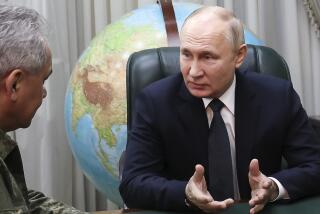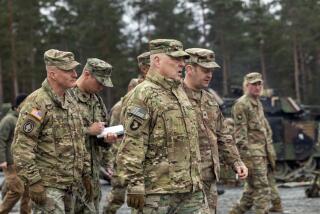Rumsfeld Gets Rosier Report in Iraq
- Share via
BAGHDAD — Defense Secretary Donald H. Rumsfeld saw firsthand the U.S.-led coalition’s strategy for turning over security to Iraqis in a sweep through the nation Saturday, as military officials lauded a precipitous drop in attacks on American troops even as they acknowledged it was probably the result of poor weather and the end of the Muslim holy month of Ramadan.
The Pentagon chief focused much of his visit on briefings and demonstrations of the fledgling Iraqi Civil Defense Corps, one of four security forces run by the occupying coalition. The Pentagon’s strategy in Iraq is to increasingly turn control of security -- police, border patrol and military actions -- to newly established Iraqi agencies that, in the case of the Civil Defense Corps, often receive less than one month’s training.
With 140,000 Iraqi border patrol and police officers, paramilitary troops, building guards and other security forces in place, Rumsfeld said, “they are increasingly taking over security in this country.” He trusted his own fate to members of the corps, entering a Baghdad warehouse in which roughly 50 new recruits toting AK-47s were in their first days of training.
During his first stop of the day, in the northern city of Kirkuk, Rumsfeld met with a group of recruits and their commanders in crisp new khaki uniforms at a lavish home confiscated from an unnamed Iraqi on the most-wanted former regime officials list. The Civil Defense Corps is coming along “very fast,” he told the recruits, giving Americans confidence that it “can make a tremendous difference.”
“Foreign forces are necessarily unnatural,” Rumsfeld told reporters later after visiting the training center at an 82nd Airborne Division site in Baghdad. “They ought not to be in a country.”
During the visit, which was roughly scheduled a week earlier but not announced publicly, Rumsfeld met briefly with the coalition’s top civilian administrator, L. Paul Bremer III, U.S. Central Command chief Gen. John Abizaid and a who’s-who of the commanding U.S. generals in Iraq.
In Kirkuk, Maj. Gen. Ray Odierno of the 4th Infantry Division briefed Rumsfeld on his area of responsibility in the volatile Sunni Triangle north of Baghdad, as did the 1st Armored Division’s Brig. Gen. Martin Dempsey, in charge of security in the sprawling capital. Rumsfeld was joined throughout the day by the top commander on the ground, Lt. Gen. Ricardo Sanchez.
Several senior military officials lauded a decline in attacks on U.S. troops, saying such assaults have plunged from nearly 40 a day in early November to 19 daily over the last week. Nevertheless, they acknowledged, it was not clear that the decline would endure, and many suggested that attacks might increase during the hajj pilgrimage that starts in late January.
“Well, I think that it’s too early to say it’s a trend,” Rumsfeld told reporters. “It’s a good sign that they’ve dropped off -- and they have dropped off. Gen. Sanchez and I have been talking about that fact, but of course Ramadan has just ended, there has been some rain in parts of the country, so I’m not in a position to say we’re on a favorable trend line.”
The coalition death toll soared during Ramadan, making November the costliest month in lives for the United States and its allies since the invasion of Iraq more than eight months ago.
Dempsey said four of 10 known guerrilla cells were disabled in November, including one that he said was responsible for the October rocket attack on the Rashid Hotel that killed a U.S. Army colonel while Deputy Defense Secretary Paul D. Wolfowitz was in the building.
The 1st Armored Division is still pursuing intelligence that it hopes will allow the division to crush the remaining six cells, he said. The arrests have diminished but not ended the insurgents’ ability to launch attacks because their leadership and financiers remain at large, Dempsey said.
Nevertheless, Sanchez painted a portrait of gradual success for Rumsfeld’s third visit since President Bush declared major combat over May 1.
“The main message to the secretary is primarily that we’re being successful, our troops are prepared, and we’re making a lot of progress,” Sanchez said.
More to Read
Sign up for Essential California
The most important California stories and recommendations in your inbox every morning.
You may occasionally receive promotional content from the Los Angeles Times.










